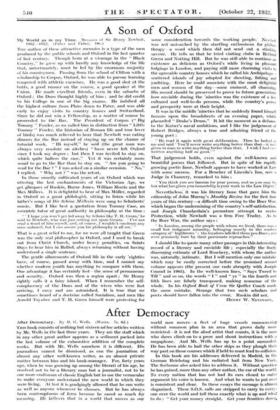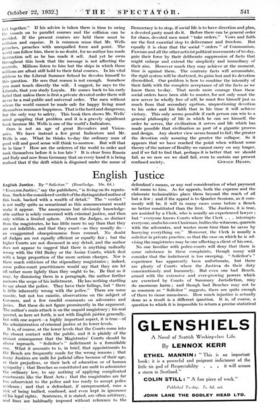After Democracy
After Democracy. By H. G. Wells. (Watts. 7s. 611.) ' -Tins book consists-of nothing but sixteen-ad hoc articles written -by Mr. Wells in the last three years. They are the stuff which -in any other great author appears as a sediment packed into -the last volume of the exhaustive addition of the complete works. But with Mr. Wells 'somehow it is different. His journalism cannot be dismissed, as can the journalism of -almost any other well-known writer, as an almost private matter between him and his bank-manager. For, forty years ago, when he was growing up among the literati of his age, he :resolved not to be a literary man but a journalist, not to be .one more craftsman of classic English but to use the vernacular to make everyone understand the new world in which they were living. At last it is grudgingly allo- wedthat he can write as well as anyone whenever he chooses. But he has always . been contemptuous of form because he cared so much kir 'meaning. He believes that in a' World that moves as our
world now moves—a fleet of huge vessels manoeuvring without common plan in an area that grows daily more restricted—it is not the aloof artist that counts, it is the man who dares climb on to a prow and shout instructions with a megaphone: And Mr. ,Wells has up , to a_ point.succeeded- He has heen able to hail the other ships as they ploUgh their way past on those courses which if held to must lead to collision.
In this book are his _addresses delivered in Madrid, in the German Reichstag and his radiated hail from New York. The Sorhonne also asked him to address it. . Without question he has gained, more than any other author, the ear of the world. To every nation that has not had its ears closed to outer argument his voice is known. And what he wants to put over is consistent and clear. In these essays the message is almost sloganized. These S.O.S. calls are stripped to carry to every- one over the world and tell them exactly what is up and what to do : " Get your money straight. Get your frontiers down,
Get together." If his advice is taken there is time to swing the vessels on to parallel courses and the collision can be avoided. If the present courses are held there must be collision and capsize. It is common sense that Mr. Wells preaches, preaches • with unequalled force and point. .-The world can follow him, there is no doubt, for no author has made instruction sell as he has made it sell. And yet he owns throughout this book that the message is not affecting the controls. Millions listen to him but the ships in which those millions are afloat still hold to their fatal courses. - In his vital address- to the -Liberal Summer School he devotes himself to this question. He sees that reason is not enough. Somehow you must touch directly the will. I• suggest, he says -to' the Liberals, that you study Loyala. He comes back to his early belief that unless there is first a private devoted order there will never be a real public and universal order. The men without whom the world cannot be made safe for happy living must themselves renounce happiness. That is the hard and dangerous, but the only way to safety. This book then shows Mr. Wells' mind grappling that problem and it is a gravely significant book because Mr. Wells is one of the world's. Indicators.
Ours is not an age of great Revealers and Vision- aries. We have instead a few great Indicators and Mr. Wells is one. What he thinks to-day the ordinary man of good will and good sense will think to-morrow. But will that be in time ? How are the orderers of the world to order and rank themselves before it is too late ? It is clear from Russia and Italy and now from Germany that on every hand it is being realised that if the drift which is disguised under the name of
-Democracy is to stop, if social life is to have direction and plan, a devoted party must do it. Before there can be general order for chaos, devoted men must "take orders." Vows and faith are the first essential step to deliverance and freedom. But equally it is clear that the ' social " orders " of Communism, Fascism and all the other activist political movements of tb-day, gain their force by their deliberate suppression of facts that might enlarge and extend the simplicity and immediacy of their aim. However much they may achieve at the moment, time is against them. The contrary facts will accumulate, the rigid system will be shattered, its gains lost and its devotion discredited. Our problem is how to combine the intensity of their faith with the complete acceptance of all the facts as we know them to-day. That needs more courage than these social orders have been able to muster, for not only must the new server be wholly free of self, he must free himself just as much from that secondary egotism, unquestioning devotion to his order and his faith that in his time it will achieve victory. This only seems possible if each person can win to a general philosophy of life in which he can see himself, the order he serves, the civilization it serves and life which has made possible that civilization as part Of a gigantic process and design. Any shorter view 'seems hound to fail ; the greater the devotion only assuring the greater the collapse. So it appears that we have reached the point when without some theory of the nature of Reality we cannot carry on any longer, and if we fail to find that, perhaps it is better that we should fail, as we now see we shall fail, even to sustain our present















































 Previous page
Previous page